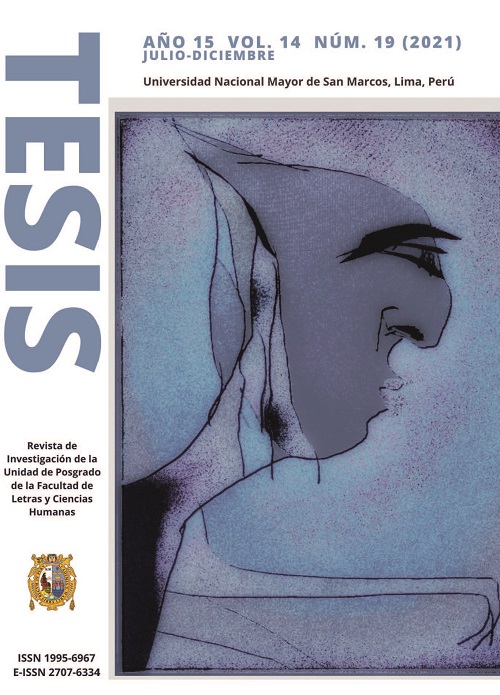Pluralismo lógico, normatividad y la objetividad del conocimiento lógico
DOI:
https://doi.org/10.15381/tesis.v14i19.21941Palabras clave:
pluralismo lógico, normatividad, objetividad, antiexcepcionalismo, prácticas prescriptivasResumen
Uno de los debates actuales en filosofía de la lógica es entre los que defienden el carácter especial de la lógica y el enfoque del antiexcepcionalismo lógico. A este debate se suma la dificultad de establecer un criterio lógico de corrección objetivo más allá del propio sistema lógico. En este trabajo, se analiza el papel de la normatividad y de la objetividad de la lógica en el contexto del problema del pluralismo lógico. Se examinará si se puede dar cuenta de que hay hechos lógicos genuinos, para averiguar cómo una teoría incompatible respecto de esa ley lógica debería afectar a nuestras creencias en esos casos y justificar algún tipo de no-factualismo sobre esa regla. Se discuten los enfoques no-factualistas y se muestra que no son exitosos. Se analizará, finalmente, el papel de la normatividad lógica y si esta se aprehende mediante la adquisición y aplicación posterior de reglas.
Referencias
Anderson A. R. y Belnap N. D., (1959). A simple treatment of truth functions. Journal of Symbolic Logic, 24, 301-302.
Barth, E. M. y Krabbe, E. C. W. (1982). From axiom to dialogue. A philosophical study of logics and argumentation. De Gruyter.
Beall, J. C. y Restall, G. (2000). Logical pluralism. Australasian Journal of Philosophy, 78(4), 475-493.
Beall, J. C. y Restall, G. (2006). Logical pluralism. Oxford University Press.
Boghossian, P. A. (2000). Knowledge of logic. En P. Boghossian y C. Peacocke (Eds.), New essays on the a priori (pp. 229-254). Oxford University Press.
Boghossian, P. A. (2014). What is inference? Philosophical Studies, 169, pp. 1-18.
Boghossian, P. A. (2015). Rules, norms and principles: A conceptual framework. En M. Araszkiewicz, P. Banaś, T. Gizbert-Studnicki, K. Płeszka (Eds.), Problems of normativity, rules and rule-following, 111, 3-13, Springer.
Boghossian, P. y Williamson, T. (2020). Debating the a priori. Oxford University Press.
Burgess, J. (1992). Proofs about proofs: a defense of classical logic. En M. Detlefsen, Proof, logic and normalization (pp. 8-23). Routledge.
Carroll, L. (1895). What the tortoise said to Achilles. Mind, 4(14), 278-280.
Cotnoir, A. J. (2018). Logical nihilism. En Pluralisms in truth and logic (pp. 301-329). Palgrave Macmillan, Cham.
Carnap, R. (1937). The logical syntax of language. Harcourt, Brace and Company. trad. [A. Smeaton, Trad.). (Logische Syntax der Sprache, 1934).
Eklund, M. (2012). The multitude view on logic. En New waves in philosophical logic (pp. 217-240). Palgrave Macmillan.
Field, H. (1996). The A prioricity of logic. Proceedings of the Aristotelian Society, 96, 359-379.
Field, H. (2000). Apriority as an evaluative notion. En P. Boghossian y C. Peacocke (Eds.), New essays on the a priori (pp. 117-149). Clarendon Press.
Field, H. (2001). Truth and the absence of fact. Oxford University Press.
Field, H. (2009). Epistemology without metaphysics. Philosophical Studies, 143, 249-290.
Frege, G. (1979). Posthumous writings. H. Hermes, F. Kambartel y F. Kaulback (Eds.), P. Long y R. White (Trans.). University of Chicago Press.
Gibbard, A. (1990). Wise choices, apt feelings: A theory of normative judgement. Oxford University Press.
Martínez-Vidal, C. (2000). Is second-order logic logic? En The Logica Yearbook 1999 (pp. 22-36). The Institute of Philosophy. Academy of Sciences of the Czech Republic.
Martínez-Vidal, C. (2004). The view of logic as model and the objectivity of logic. Reti, Saperi, Linguaggi. Logic, Ontology, and Linguistics / Logica, Ontologia, Linguistica, I, 35-74.
Martínez-Vidal, C. (2005). Is logic objective? Cadernos de Filosofía (Revista do Instituto de Filosofia da Linguagem de Lisboa), 18, 7-38.
Priest, G., Berto, F. y Weber, Z. (2018). Dialetheism. En Edward. N. Zalta (Ed.), The Stanford Encyclopedia of Philosophy. https://plato.stanford.edu/archives/fall2018/entries/dialetheism/
Quine, W. V. (1936). Truth by convention. Journal of Symbolic Logic, 1(1).
Quine, W. V. (1953). From a logical point of view. Harvard University Press, Mass.
Railton, P. (2000a). A priori rules: Wittgenstein on the normativity of logic. En P. Boghossian y C. Peacocke (Eds.), New essays on the a priori (pp. 170-196). Oxford University Press.
Railton, P. (2000b). Normative force and normative freedom. En J. Dancy (Ed.), Normativity. Ratio Special Issues (pp. 1-33). Wiley-Blackwell.
Russell, G. (2018). Varieties of logical consequence by their resistance to logical nihilism. En Pluralisms in truth and logic (pp. 331-361). Palgrave Macmillan, Cham.
Von Mises, L. (2008). Human action. A treatise on economics. (4.ª ed.). Ludwig von Mises Institute.
Williamson, T. (2013). Modal logic as metaphysics. Oxford University Press.
Williamson, T. (2014). Logic, metalogic and neutrality. Erkenntnis, 79, 211-231.
Wittgenstein, L. (1953). Philosophical investigations. Macmillan.
Wittgenstein, L. (1981). Remarks on the foundations of mathematics. (3.ª ed.). Basil Blackwell.
Wright, C. (2004a). Warrant for nothing (and foundations for free)? Aristotelian Society Supplementary, 78(1), 167-212.
Wright, C. (2004b). Intuition, entitlement and the epistemology of logical laws. Dialectica, 58, 155-175.
Wright, C. (2001). On basic logical knowledge. Philosophical Studies, 106, 41-85.
Wright, C. (2014). Comments on Paul Boghossian, What is inference? Philosophical Studies, 169, 27-37.
Wyatt, J., Pedersen, N. J. y Kellen, N. (Eds.) (2018). Pluralisms in truth and logic. Palgrave Macmillan.
Yates, S. (2005). What Austrian scholars should know about Logic (and why). Quarterly Journal of Austrian Economics, 8(3), 53.
Descargas
Publicado
Número
Sección
Licencia
Derechos de autor 2021 María Dolores García-Arnaldos

Esta obra está bajo una licencia internacional Creative Commons Atribución 4.0.
LOS AUTORES RETIENEN SUS DERECHOS:
a. Los autores retienen sus derechos de marca y patente, y también sobre cualquier proceso o procedimiento descrito en el artículo.
b. Los autores retienen el derecho de compartir, copiar, distribuir, ejecutar y comunicar públicamente el artículo publicado en la revista Tesis (Lima) (por ejemplo, colocarlo en un repositorio institucional o publicarlo en un libro), con un reconocimiento de su publicación inicial en la revista Tesis (Lima).
c. Los autores retienen el derecho a hacer una posterior publicación de su trabajo, de utilizar el artículo o cualquier parte de aquel (por ejemplo: una compilación de sus trabajos, notas para conferencias, tesis, o para un libro), siempre que indiquen la fuente de publicación (autores del trabajo, revista, volumen, numero y fecha).






